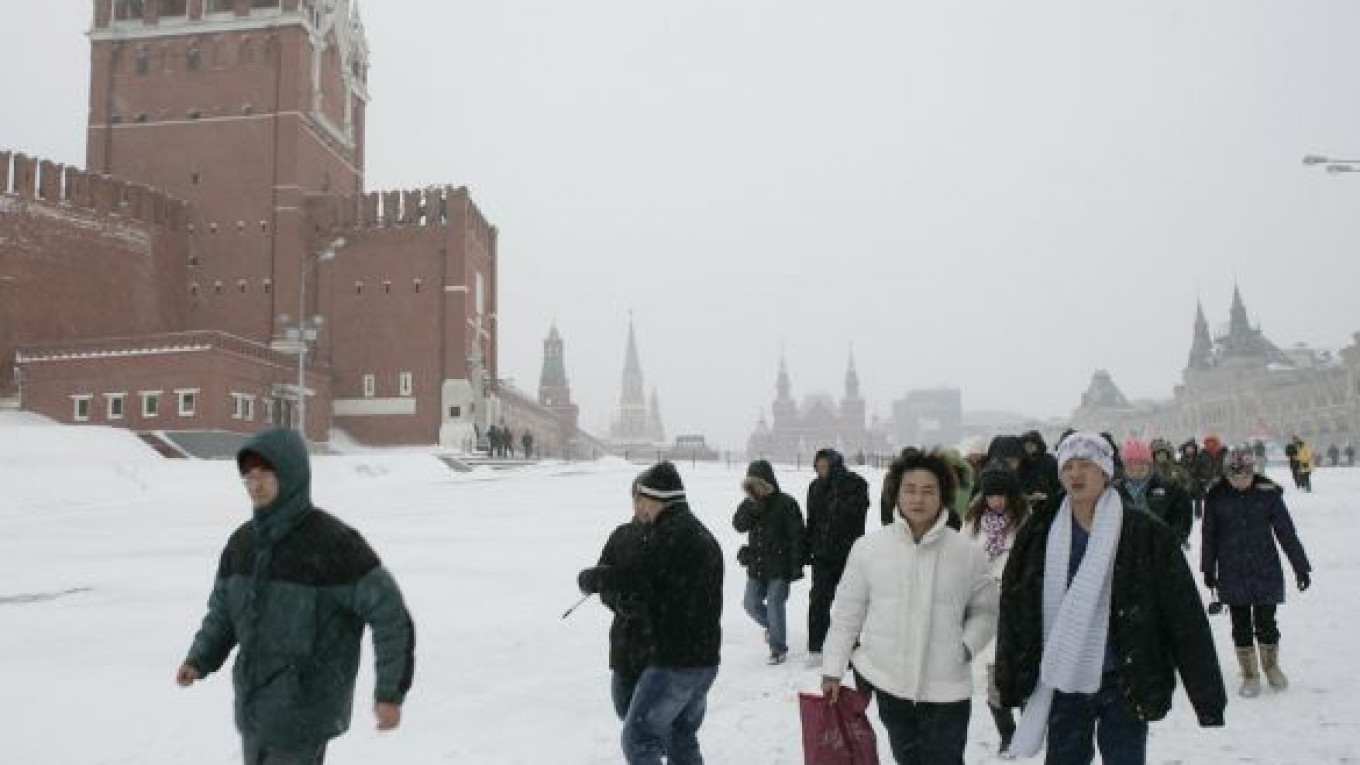Glitzy and decadent, the nonstop Russian capital is famed for its exorbitant prices, extravagant nightlife and freezing winter temperatures.
But there is a lot more than glamour and excess: It has fabulous art, a slew of Soviet-era gems, exotic cuisine from the Caucasus and Central Asia, and simple pleasures rare in the West. How to get the most out of a stay in this vast city of almost 11 million?
Friday
12 p.m. — Head straight to Red Square, where Soviet dictator Josef Stalin gave speeches and shivering Russians ring in the New Year. Check out the mammoth Soviet department store GUM, now filled with Cartier and Gucci, colorful St. Basil’s Cathedral and the red-bricked Kremlin. Go see Vladimir Lenin, founder of the Soviet Union, in his granite mausoleum in a pool of red light. Round the back, find graves of Soviet leaders Stalin and Leonid Brezhnev, which often have fresh flowers. (Mon., Wed. and Fri. till 1:30 p.m.)
3 p.m. — Stroll past the cream, eight-columned, 18th-century Bolshoi Theater and over to cobbled and dainty Stoleshnikov Pereulok, Moscow’s answer to Bond Street.
6 p.m. — Have a delicious Georgian meal at Mama Nina, near Christ the Savior Cathedral, the tallest Orthodox church in the world. Or try Suliko, a genuine Georgian chain dotted across the city that has staples from the Caucasus country such as khinkali, or succulent meat dumplings, rolled eggplants with nuts and pomegranate and khachapuri, made of flaky pastry and homemade cheese served straight from the oven.
9 p.m. — Hit the ultra-hip converted chocolate factory Krasny Oktyabr, perched on an island across from the Kremlin. The red-brick complex is packed with nightclubs featuring foreign DJs such as the popular Rolling Stone, and also has cafes and photography galleries. In the summer, watch the sun come up over Moscow from their spacious balconies after a hedonistic night of revelry.
Saturday
8 a.m. — Try Correa’s, an airy, high-ceilinged eatery that has healthy breakfasts and the freshest fruit salad you will find in the dead of winter.
9 a.m. — Get your fill of gold onion domes among the Kremlin’s 500-year-old churches built for the tsars, which are a stone’s throw from President Dmitry Medvedev’s office (open daily until 5 p.m.).
11 a.m. — In winter, head to Gorky Park to ice skate (cheap rental on spot) among the birch trees on icy paths.
12 p.m. — Venture into the Sculpture Park opposite. Abandoned marble statues of Lenin, Stalin and Karl Marx sit solemnly on this large patch of greenery.
1 p.m. — Next door sits the monolithic New Tretyakov Gallery. More than 65 rooms of modern Russian and European art line its Soviet-era walls, including avant-garde masters Wassily Kandinsky and Alexander Rodchenko.
2 p.m. — Nearby, on Kaluzhskaya Ploshchad, find Moscow’s largest-surviving statue of Lenin, striking his famous pose.
3 p.m. — Have a late lunch at glamorous restaurant Uzbekistan. Pricey and stylized as a silk road caravanserai, the Moscow elite dine here on some of the city’s best Uzbek dishes, especially grilled meats and plov, an Uzbek staple of slow-cooked rice pilaf and tender lamb.
5 p.m. — As evening approaches, wander toward the quiet oasis of Patriarch’s Ponds. Immortalized in Mikhail Bulgakov’s novel “The Master and Margarita,” the quiet quarter has boutique shops and small cafes. Ice skate on the pond, which stocked fish for the Russian Orthodox clergy in the 19th century.
7 p.m. — Eat borshch, a traditional, thick beetroot soup, at Cafe Margarita, which overlooks the pond. No bigger than a living room and lined with books, it has live piano and fiddle music nightly and is also good for a drink.
10 p.m. — For a glimpse at some modern art and possibly a lecture, check out Art Strelka on Bersenevskaya Naberezhnaya. Strelka, set up this year by Dutch architect Rem Koolhaas, is Moscow’s new “it” bar and attracts a well-dressed Bohemian crowd. For food, its restaurant has Russian-European fusion, while the downstairs bar blasts music till the early hours.
Sunday
10 a.m. — Venture out southwest to Vorobyovy Gory, or Sparrow Hills (previously Lenin Hills), for an impressive vista of the capital. Perched up high is the foreboding Moscow State University, one of the “Seven Sisters,” elaborate Gothic skyscrapers built by Stalin.
12 p.m. — A must-see for art lovers is Garage, Moscow’s answer to London’s Tate Modern. Set up by Dasha Zhukova, girlfriend of Russian oligarch Roman Abramovich, the gallery became an instant hit with fashionistas. Housed in a 1920s bus garage created by avant-garde architect Konstantin Melnikov, it caters to a global audience and has a tasty cafe.
3 p.m. — Buy a metro ticket for a mere 28 rubles ($1) and finish off Moscow with the world’s cheapest tour. Speed around this elegant beast that is fiercely efficient and still lit by chandeliers. Gawk at the Ploshchad Revolyutsii metro station, where life-sized bronze Soviets point rifles, and admire the stained glass chambers of Novoslobodskaya.
A Message from The Moscow Times:
Dear readers,
We are facing unprecedented challenges. Russia's Prosecutor General's Office has designated The Moscow Times as an "undesirable" organization, criminalizing our work and putting our staff at risk of prosecution. This follows our earlier unjust labeling as a "foreign agent."
These actions are direct attempts to silence independent journalism in Russia. The authorities claim our work "discredits the decisions of the Russian leadership." We see things differently: we strive to provide accurate, unbiased reporting on Russia.
We, the journalists of The Moscow Times, refuse to be silenced. But to continue our work, we need your help.
Your support, no matter how small, makes a world of difference. If you can, please support us monthly starting from just $2. It's quick to set up, and every contribution makes a significant impact.
By supporting The Moscow Times, you're defending open, independent journalism in the face of repression. Thank you for standing with us.
Remind me later.






